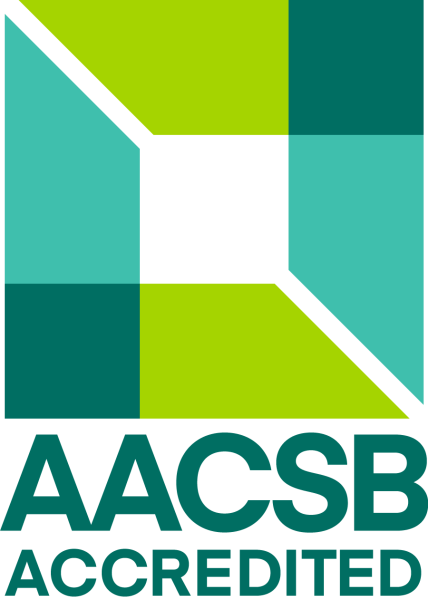Online MBA admissions at the KU School of Business
The KU School of Business is proud to welcome students from all over the world to this engaging program. Our passionate and experienced faculty are preparing the next generation of business leaders through our engaging online MBA program.
We want to help simplify your admissions process. Admissions outreach advisors are here to answer any questions regarding the application or the admissions process.
Before starting your application, please review the online MBA application checklist.
Admission requirements
To be eligible for acceptance into the KU School of Business online MBA program, prospective students must provide:
- Completed online application
- Bachelor's degree from an accredited institution (3.0 GPA or higher preferred)
- Executive Assessment score or waiver
- Resume or CV (two years or more work experience preferred)
- Two letters of recommendation
- Personal Statement
- Application fee: $65 ($85 for international students)
Note: Provisional admission may be offered to applicants who meet all requirements for admission but have a bachelor's degree (or international equivalent) with a 2.0-3.0 cumulative GPA from an accredited university. Provisional admission affords one semester of enrollment in the MBA program, at the conclusion of which a 3.0 GPA must be earned or the student is subject to dismissal.
Designed for motivated, career-focused professionals, KU's No. 8 Best Online MBA program1 takes a holistic approach to admissions. We've replaced the traditional GMAT requirement with an Essential Skills Assessment. Emphasizing your professional potential over test scores, we believe the assessment better aligns with the skills and knowledge needed in today's business world.
We seek candidates who:
- Value KU's reputation for excellence
- Want to elevate their careers with practical leadership skills
- Are ready to make real impact in their organizations
- Demonstrate potential through professional experience
AACSB accreditation ensures MBA quality
Accreditation by the Association to Advance Collegiate Schools of Business (AACSB) assures you that the KU online MBA meets or exceeds rigorous standards for curricula, faculty quality, and student satisfaction.
It’s a good time to become a Jayhawk
Ready to join the next cohort of business leaders? The KU online MBA offers three starts per year, so there’s always an opportunity for you to begin the next chapter of your career journey.
Not sure where to start?
Ready to apply to KU's online MBA but feeling a little overwhelmed? Jeremiah and Tatiana, our knowledgeable admissions outreach advisors, are your go-to resources. Both of them understand the key steps to applying and can help you get organized for submitting your application. They’ll also help you understand what’s needed for eligibility and can tell you more about the Essential Skills Assessment. With Jeremiah or Tatiana’s assistance, your application to KU's online MBA program can be smooth and stress-free.

How to Apply
Before starting your application, download our handy one-page application checklist for easy reference. This guide lists all requirements for the University of Kansas online master's degrees in business administration.
Step 1: Create your account
Click on Start New Application in the middle of the screen.
Select Lawrence/Edwards Graduate Application 2025 from the drop down on the pop up and then click “Create Application.”
Click “Open Application” on the pop up that shows up next.
Step 2: Fill out the basic information
On the Student Details page, fill out at least all the required fields, notated by the red asterisk, and click continue at the bottom of the page.
On the Graduate Program Info page:
- Check “Yes” where you are asked if you are applying for a fully online program.
- In the Academic Intention drop down select “Degree-Seeking.”
- In the Academic Area of Interest select “Business”
- Under “Academic Program” select Business Administration (Online)(MBA).
Click Continue.
From the drop-down menu on the Entry Term page, select the semester that you would like to apply for, then click continue.
Step 3: Consider the Business Supplement and fill out your academic history
Click Continue.
On the Academic History page, start typing the name of your undergraduate institution and select it as soon as it shows up as a suggested option.
If you have copies of your official transcripts, attach them to this page. Repeat for each school where you’ve earned a degree.
Click Continue.
Step 4: Add contact info for your recommenders
On the Recommendations page, click Add Recommender.
- Select whether they are academic, colleague or supervisor.
- Fill out each recommender’s contact information accordingly, including an email address.
- NOTE: As soon as you complete this information, an email will be sent to the recommender asking for them to submit their letter of reference on your behalf.
Click Continue.
Step 5: Add additional information
Click Continue.
Step 6: Upload a statement of purpose
Type up your statement in a word processor and attach it on this page as a Word document or PDF.
Click Continue.
Step 7: Upload your resume, review and submit
Click Continue.
On the Signature Page, read the entire statement. Type your full name in place of your signature to indicate that you have read and understood the statement.
Click Confirm.
On the Review Page, look for any sections highlighted in red. This indicates required fields that are missing information. Update any sections as needed.
When there are no red fields/missing information in the application, you can click Submit to turn in your application.
Congrats, you’ve officially applied to KU!
Reach out to your admissions outreach advisor for next steps and information on current processing times or testing requirements.
Paying for your degree
The team at KU knows that even when pursuing an affordable degree with great career possibilities, advanced education is a major investment. Visit our tuition page to explore detailed information about payment options, scholarships, and other financial resources available to help fund your degree.
Make your ascent with the online MBA community
The University of Kansas has mastered the art of building meaningful connections in the digital space. Through interactive learning tools, collaborative projects, and virtual networking events, you'll forge lasting relationships with your online MBA cohort of ambitious professionals, expert faculty, and more than 25,000 KU School of Business alumni, some of whom work at Fortune 500 companies and serve as global industry leaders.* Plus, they're ready to help fellow Jayhawks succeed. Through the KU School of Business network, you'll gain access to:
- ✓ Virtual networking events
- ✓ Mentorship opportunities
- ✓ Career development resources
- ✓ Industry insights and connections
*Based on a limited sample of self-reported data from alumni of the University of Kansas School of Business online MBA program from 2019-2022 graduating cohorts
Broaden your horizons at KU
Complete the form below to receive more information about the program, straight to your inbox.
Online MBA Admissions Frequently Asked Questions
Application Deadlines
Does your office need to receive all application materials by the application deadline?
Transcripts
What are the transcript requirements for admission?
Where should I send my transcripts?
KU Visitor Center Graduate Admissions
1502 Iowa St.
Lawrence, KS 66045
Do you accept secure electronic transcript delivery service sent directly from the issuing institution?
Can I scan and submit a physical transcript document? If so, what email address should I use?
Do I need to obtain copies of all my transcripts, even if I only took one course at an institution?
I do not have a bachelor’s degree from the U.S. What official documents does KU require?
Test Scores
How do I send my scores to KU?
Will my application still be considered if my test scores do not arrive by the specified deadline?
Do you accept the IELTS (International English Language Testing System) for International Students?
Do I have to submit IELTS/TOEFL scores if I have earned a degree from a U.S. institution?
General Admissions Questions
How long does my personal statement need to be?
When will I be notified of an admission decision?
Who should write my letters of recommendation?
Is the application deadline flexible?
Can I meet with a program faculty member during the application process?
How does KU’s cohort model allow for unplanned breaks in the program? Am I able to take a leave of absence if necessary?
Students may take a leave of absence for up to one year and still stay active in the program.
What if I’m a non-native English speaker?
Online Application Questions
How do I start my online application?
What if I forget my password?
What if I have problems while completing the application?
What if I cannot find my school listed on the application?
- Searching within a city or state will return a list of all schools in that selection
- Searches of three or less characters will only return exact matches
- If you still cannot find your school after several attempts, click on "none of the above," and enter your school information manually into your application
What if I cannot upload a file?
- Save and upload your file as a Word doc or PDF. This is the best option for getting past the ASCII character options
- Avoid using special characters ( ~, #, %, & , *, {, }, \, :, , ?, /, |,) in the file name
- Use the icon beside the "Upload File" field to remove existing files. If you cannot remove a file that was uploaded in error, contact your admissions outreach advisor for assistance
Can I save my application and work on it later?
What if I need to resend the email reference request to my recommender?
Schedule Planning
What kind of weekly time commitment does this program require?
Is it possible to complete this program while also working a full-time job?
Approximately how many courses should I expect to complete each year?
- Retrieved on January 28, 2026, from usnews.com/education/online-education/university-of-kansas-155317


